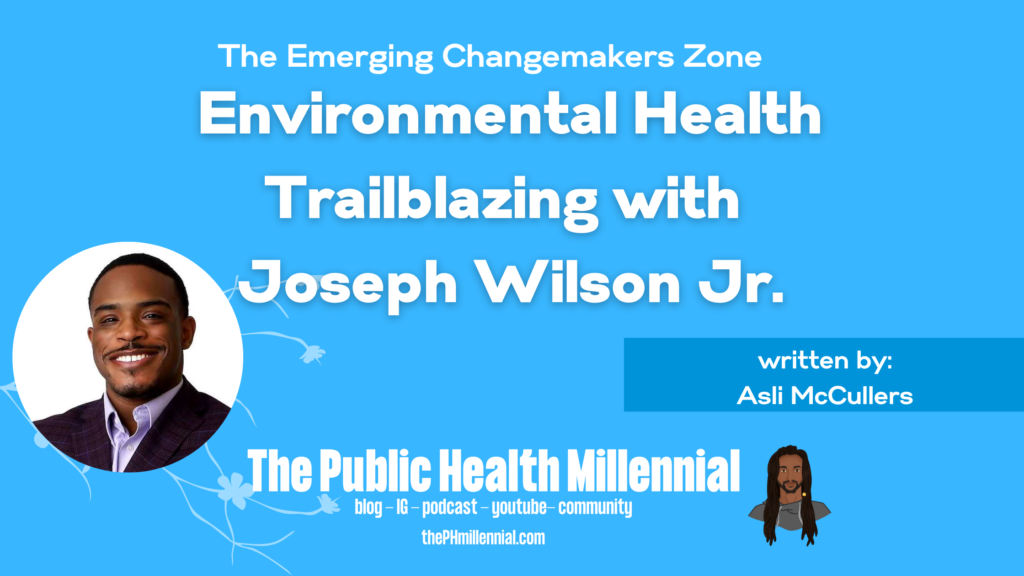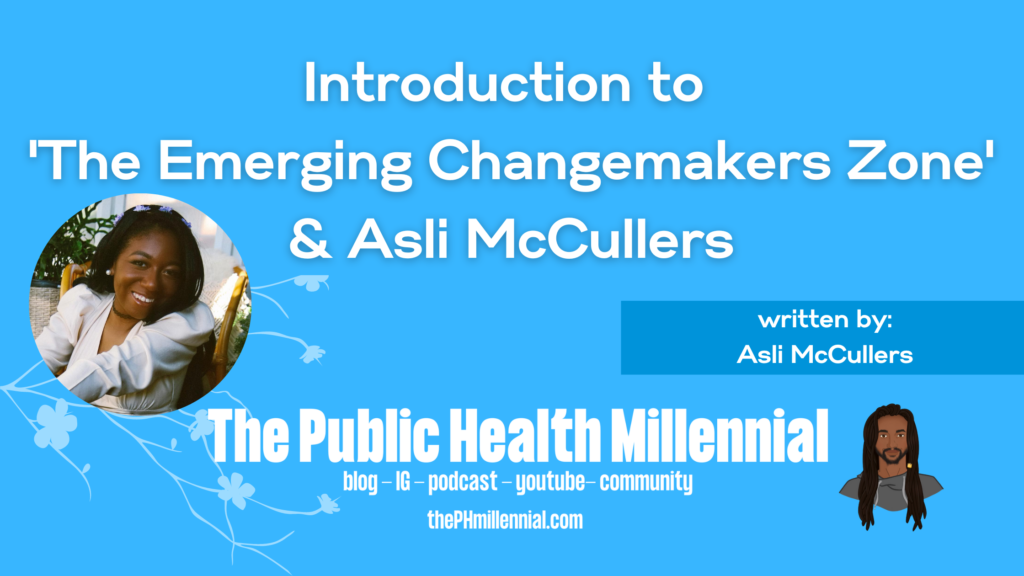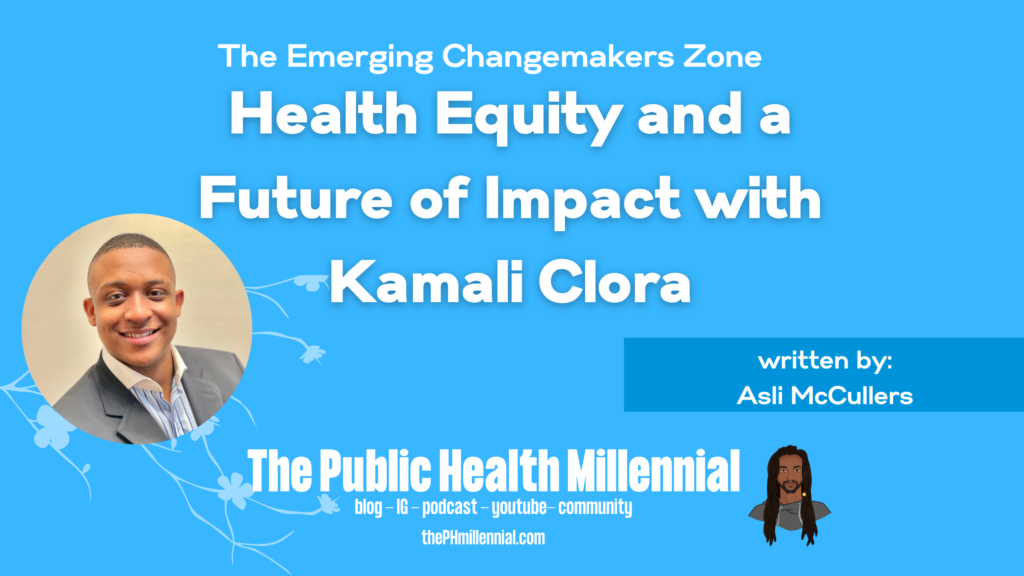Introduction
Are you working on finding your footing as an aspiring health equity researcher? Joseph is a Doctor of Philosophy (PhD) in Population Health student with a concentration in Environmental Health at Harvard University. He previously earned his Masters in Health Science at Johns Hopkins University, and his Bachelor of Arts from Williams College. This conversation covers his journey to Harvard, thoughts on managing imposter syndrome, and his reflections on aspiration for health equity leaders.
Finding Your Way: Joseph’s Journey to Environmental Health Justice at Harvard
Like many of us in public health, Joseph’s journey did not initially begin in public health. To the core, Joseph always knew he wanted to engage in work that helped create a healthier future for children–so his steps started in a dream to become a pediatrician. In this pre-medical journey, he began to pick up on the ways health inequity manifests in our environments. Joseph shared;
“In high school, the Flint water crisis happened…we learned about how this African American working class community [Flint, Michigan] has been marginalized and has adverse health outcomes due to policies or decisions by people who don’t really care about these individuals. So, for me it’s saying that this is beyond looking at their identifiers. These are humans who deserve to live in healthy environments. And on top of that, it’s Black individuals whose voices are being suppressed–this is not okay. And with that idea, with how we help the environment in my mind, I realized there was a disconnect–and I discovered public health.”
During undergrad and after his exposure to health inequity, Joseph slowly pivoted his goal of becoming a pediatrician towards bigger picture social determinants of health work. His focus shifted to systematically addressing health outcomes like asthma in children. Eventually, he found himself captivated by environmental health–searching for internships he had a moment of reckoning, sharing, “in my google search for internships, I realized what environmental health was and I was like wait, this is a whole field? Like, what?” Joseph went on to intern at Icahn School of Medicine at Mount Sinai in the Pediatric Environmental Speciality Unit, which allowed him to see how interdisciplinary and expansive public health was in action. After this experience, Joseph held a prestigious internship at Johns Hopkins University that, while in kidney disease rather than environmental health, concretely carved out his interest in health equity.
“…it was something different” Joseph recalled, “…but I feel like it wasnt foreign because it had this element of health equity, and I realized that was really what I was interested in. No matter the field, how do we understand how two groups across the street from each other have a 10-12 year life difference? Why is that the case? Even with kidney transplant disparities–why in the first place do Black people have a higher need for kidney transplants, but they are lower on the list in every step of the transplant process?”
Joseph and I laughed and bonded over how basic science courses (chemistry, anatomy & physiology, physics, etc.) showed us both that “wet lab” disciplines were not our calling, and that community-facing public health research was the best avenue for the trajectory of our career. Because of this, Joseph changed his plans from pursuing medical school to pursuing his Masters in Health Science (MHS) at Johns Hopkins University. “I think I realized that rather than being the master in everything as both a pediatrician and a public health expert …I could just be rooted deeply in my particular field in public health, and let that reach be influential.” Like myself and many others, Joseph had a love-hate relationship with the idea of continuing his education further, and decided to spend time in the field addressing child health as a Program Coordinator back at Mount Sinai. This experience emboldened Joseph to take the next step in his education, and while he considered the Doctor of Public Health (DrPH) route, they often require more years of in-field experience than he possessed at the time. Thus, he changed the PhD route.
As far as his application process –Joseph actually only applied to Harvard! Here’s his reasoning,
“I told myself that if I did a doctorate program, I wanted it to be one that fit me…I knew that if I’m not really interested in this thing, I’ll just either keep working (in the field) or go from there. So for me, Harvard was the only program that fit all the things on my list. I knew that I wanted to have a 4-year program–no 6 or 7 year programs; I knew I wanted something interdisciplinary; I wanted something in environmental health with the ability to touch into everything else…at Harvard, I’m not just limited to environmental health in the School of Public Health–I can also jump over to the law school, design school or policy school, for example, and take a course over there. Especially for health equity, I can add these elements to my toolkits to make sure I’m robust and holistic in conversations about children’s health…I always tell people, even if this program was a random school in the middle of the ocean, I would still be here–it just so happens it’s at Harvard (and you can’t beat that, haha)”
I think Joseph’s intentionality about applying only to the schools you truly see yourself in is so important! I’m currently in the process of applying to PhD programs myself, and I’ve been intentional about casting a very specific net in comparison to my Masters degree, where I applied to 15+ programs! It can go a long way for your overall happiness if you only “shoot you shot” at the programs that you truly dream about and are aligned with.
The Only One: Battling Imposter Syndrome as an Ivy League Grad Student
With Harvard being a world renowned institution, I wanted to learn more about how Joseph confronts pressure or feelings of imposter syndrome as a Black man. He shared,
“Thankfully, I never dealt with imposter syndrome per se…thinking back to my Masters degree at Hopkins, the summer program that I participated in there during undergrad helped me envision the space, and realize that I belong in the space. And that program was designed for minority or underrepresented students, so I was in a space with people who were similar to me…I had a community, and I think that definitely helps me now at Harvard. Having those people who I can lean on…I’m struggling, you’re struggling too–but together; 1+1 =2!”
Despite having such great tool sets for conquering imposter syndrome, there can still be isolating moments navigating elite institutions, as Joseph shared how sobering it can be to be the only African American male in his cohort. He shared,
“I’m very aware when I enter a space as the ‘only one’…of course we’re not monoliths and shouldn’t have to be a representation for all people, but I recognize that I am the only one that is in this space right now. And I realize that a lot of times in public health, I’ve been that only one–the only male, the only Black person, the only Black male…so for me, that really encompasses what I think about; what does it mean for me to be in this space, and how do I navigate it? I know that I belong in this space, but there’s definitely times where I’m thinking…I’m taking the first flight out, haha!’
I’m so thankful for how candid and fun Joseph was in these responses–sometimes in academia it can be challenging not to break a “poker face”, especially as individuals of minoritized backgrounds. But in our continued conversation, Joseph and I found many moments to laugh through some of the lesser-discussed public health struggles such as the dreaded biostats courses or “that one faculty member”–we all have more in common than we realize, which makes moments of imposter syndrome a little less daunting.
Joseph’s Tips for for Students Pursuing Health Equity
One of my questions for Joseph was what some of his tips would be for students interested in pursuing environmental health equity. Here’s what he shared;
Build Your Network and Seek Mentors: Even if they aren’t formal mentors, identifying “people” that are engaging in the kind of work that you’re interested in, even just for a conversation, is essential. Asking them questions like “what sparked your interest?” or “what does health equity mean to you?” can meaningfully shape our understanding of health equity. “You don’t have to have it all together” Joseph says, “You probably won’t! Which is okay, because this is a journey. So, as you start to meet those people and interact with them, whether they’re current students, a professor…having that understanding of this is what I want, and this is where I want to be…even now, I’m talking to 2nd and 3rd years and saying ‘hey–what classes did you take?’ Or ‘I noticed you’re in this program–can you tell me more about it?’ Because they have already blazed a piece of a trail that you want to travel on.
Permission to Explore: Keep your options open! Often as scholars, we have a strict idea of how we think our academic careers will shape out, but Joseph recommends for aspiring health equity leaders to lean into seasons of unexpected opportunity. “Keep your eyes open. If you’re someone who has a clear track of what you want to do, that’s awesome. But–sometimes, something may fall out of the sky like ‘whoa!–i didn’t know that existed!’ Give yourself that permission to explore, because that could lead to something great.”
To our readers: how do you deal with imposter syndrome in your health equity journey?
Biggest thank you again to Joseph for this both insightful and super fun conversation! It was truly an honor to hear more about his journey, and I’m so excited for all that he will do in health equity! 😊
Connect with Joseph on LinkedIn, and share this with a student interested in health equity work!



